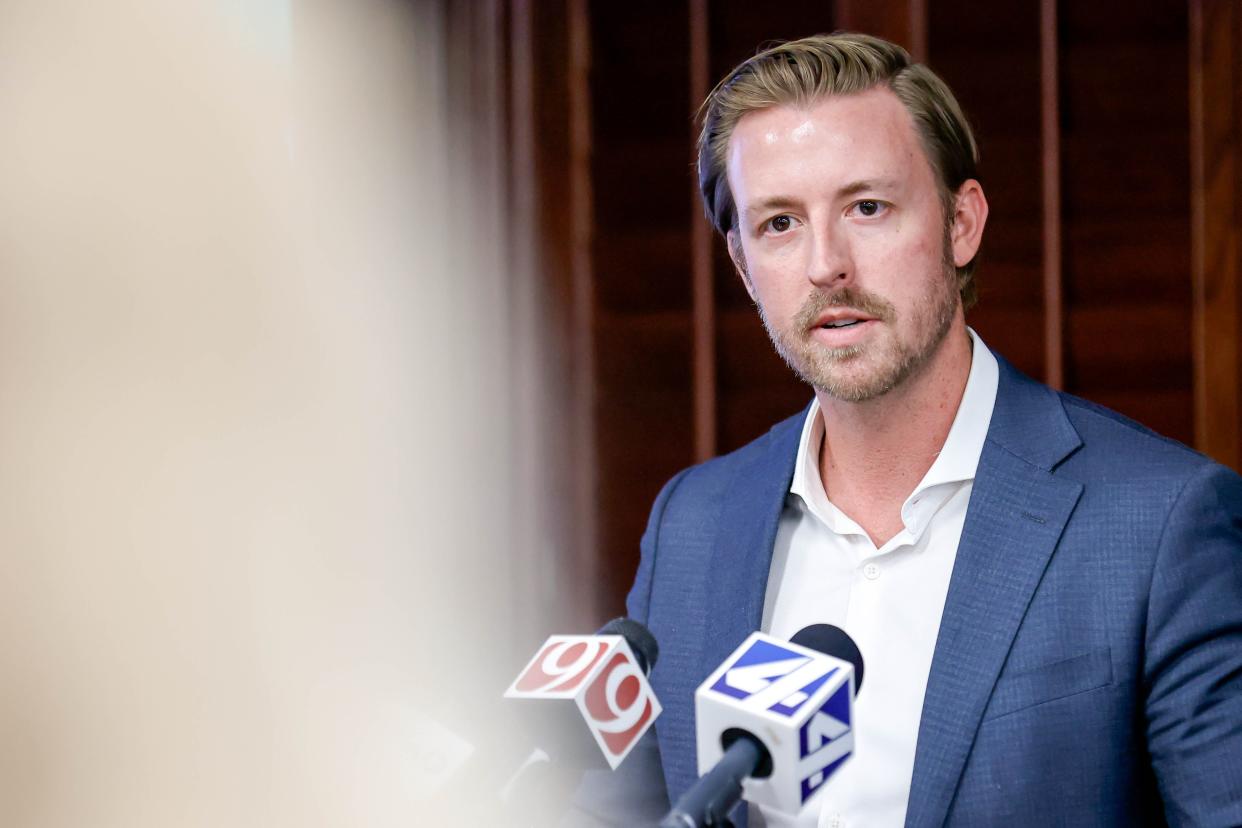Judge allows lawsuit filed by private school against Ryan Walters, state board to move forward

Regardless of a recent Oklahoma Supreme Court ruling that effectively struck down a pair of administrative rules created by the Oklahoma State Department of Education, an Oklahoma County judge on Thursday allowed a lawsuit to move forward filed by a private school against the agency and state schools Superintendent Ryan Walters.
District Judge Don Andrews asked attorneys for both sides during a hearing to file further briefs in the lawsuit, in which the school, Infinity Generation Generals Preparatory School, has claimed the Oklahoma State Board of Education didn't have the authority to revoke its accreditation or not renew its accreditation. The Oklahoma attorney general’s office is defending the state agency and Walters in the case.
Infinity says the state Board of Education, which oversees public education in Oklahoma, would first have to go through a statutory rule-making process to revoke a private school’s accreditation. Jim Johnson, the attorney for Infinity, has said the state Education Department is using rules that specifically mention governance of public schools to deal with a private-school matter.
More: Supreme Court: Schools, not Ryan Walters or state school board, have authority over libraries
Most of the courtroom discussion Thursday involved legal and procedural nuance concerning what type of arguments could be used and under what authority some legal points could be argued.
During the hearing, Johnson referenced what he said was the lack of formal notification by the state agency that the school’s accreditation had been revoked. Johnson said while the state board voted on the matter during an August 2023 meeting, it never sent notice to the school. Erin Moore, an assistant attorney general representing the state agency, said it was her stance the vote was notification enough.
Also discussed was what Andrews called “the elephant in the room,” which was the state Supreme Court ruling on June 11 in a lawsuit filed by Edmond Public Schools against the state agency, the state board and Walters. The Supreme Court blocked the enforcement of an administrative rule passed by the state board in March 2023, which prohibited school districts from having "pornographic materials or sexualized content" in libraries and threatened districts that did not comply with the potential of downgrading their accreditation.
The Supreme Court declined to rule — despite a request from both sides to do so — concerning an opinion issued last year by Oklahoma Attorney General Gentner Drummond concerning the state board's authority in rulemaking, which states no state agency has the authority to create administrative rules without the state Legislature first enacting a related law.
Drummond said a statute often used by the agency to justify its rulemaking authority wasn’t enough, in and of itself, to give the agency that authority, absent action by the Legislature. That opinion, often cited by opponents of Walters, has the force of law, absent a court ruling otherwise.
“The statutory authority for the agency to accredit private schools is limited to one statute … which the counsel for the agency says cannot be used as a basis for rulemaking, and of course they have to do rules to accredit private schools,” Johnson said. “We’ve likewise challenged the fact that they’ve never promulgated any substantive rules.”
“What it comes down to is, if the state wants to say (the August board meeting) is an administrative hearing, then they have to issue an order and not just say, hey, we’ve rendered a decision. … It would be nice if the agency would confirm what they are doing, because in the absence of rules, in the absence of a statute that permits them to act, they’re really just acting on an ad hoc basis and they’re making things up as they go.”
After the hearing, Moore referred reporters to the attorney general office’s spokesman, Phil Bacharach, who declined comment.
Why is accreditation important for a private school?
Infinity, located in northeast Oklahoma City, did not operate during the spring 2023 semester because of concerns stemming from the accreditation issue, but was open for the 2023-24 school year and plans to be open in the fall, said Gina Darby, head of school.
Accreditation is important for a private school in Oklahoma, because such recognition is necessary to receive taxpayer funds from the Lindsey Nicole Henry Scholarship Program for students with disabilities and other governmental funding. Infinity, which opened in 2014, sought accreditation from the state Board of Education in 2021. The state board downgraded the school’s accreditation for the 2022-23 school year to “accreditation with warning.”
Walters became state superintendent, and thus the chair of the state board, in January 2023. At the board’s meeting in August 2023, the board revoked Infinity’s accreditation at the recommendation of Bryan Cleveland, who then was the state Education Department's general counsel. Cleveland since has left the agency and moved out of state.
Johnson claimed in the lawsuit that a 10-minute time limitation to speak placed upon him for that meeting was a violation of the Oklahoma Open Meeting Act. Andrews has yet to rule on that.
This article originally appeared on Oklahoman: Judge allows private school's lawsuit against Ryan Walters to progress
